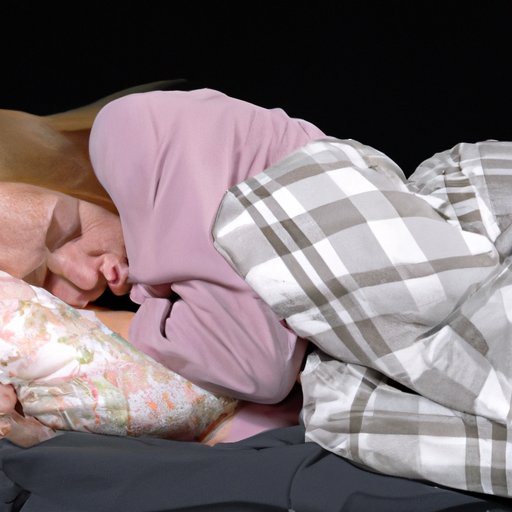
Introduction
Have you ever woken up with tears on your face and wondered if you were crying in your sleep? You’re not alone. Crying in your sleep is a phenomenon experienced by many people, but it’s still a mystery to some. In this article, we will take a closer look at the science behind crying in your sleep, emotional benefits and drawbacks, sleep disorders that may be linked to it, and coping mechanisms to help soothe yourself.
Do Tears in Your Dreams Mean Real Tears? Exploring the Science of Crying in Your Sleep
Crying is a natural bodily reaction associated with various emotions such as sadness, happiness, pain, and anger. Tears are produced when the body releases emotional stress hormones such as cortisol, adrenaline, and endorphins, which stimulate the tear ducts. But does crying in your sleep mean that you shed real tears?
According to scientific research, tears shed in dreams are not always indicative of real tears. During rapid eye movement (REM) sleep, which is the stage of sleep when we have most of our dreams, the body is unable to produce tears. Instead, it is believed that people who cry in their sleep may have residual emotions from the day that manifest in their dreams, leading to the sensation of shedding tears.
There may also be a connection between crying in your sleep and the frequency and intensity of emotions during the day, as well as any underlying psychological issues that you may have. For example, people with depression may be more prone to crying in their sleep.
The Emotional Benefits and Drawbacks of Crying in Your Sleep
Crying can be a cathartic and healing experience. It releases pent-up emotions and can help us feel better when we’re feeling sad, anxious, or overwhelmed. Crying in your sleep can have similar benefits, as the body is still releasing hormones associated with emotional release. It can help you process emotions from the previous day, leading to better mental health and a more restful sleep.
However, there may also be drawbacks to crying in your sleep. Interrupted sleep can affect your overall health and make you feel tired and groggy during the day. Additionally, the embarrassment of waking up with tears on your face can lead to feelings of shame and low self-esteem.
Personal anecdotes from people who have experienced crying in their sleep show a range of experiences, including both positive and negative. Some people find that it helps them cope with stress and anxiety, while others feel embarrassed and reluctant to talk about it.
Sleep Disorders That Could Be Linked to Crying in Your Sleep
Crying in your sleep may be a symptom of underlying sleep disorders such as sleep apnea, night terrors, or REM sleep behavior disorder. Sleep apnea is a condition in which a person’s breathing is interrupted during sleep, leading to disruptions in sleep and potential crying. Night terrors, which are different from nightmares, are episodes of intense fear or terror that occur during non-REM sleep and can lead to intense crying. REM sleep behavior disorder, on the other hand, is a condition in which a person acts out their dreams, which could lead to involuntary crying.
If you suspect that you may have a sleep disorder, it’s important to seek medical help. A doctor can diagnose and treat any underlying condition that may be causing your crying in your sleep.
Can Crying in Your Sleep Be a Sign of a Deeper Emotional Issue?
During sleep, the brain processes emotions and memories from the day. If you find yourself crying in your sleep consistently, it may be a sign of an underlying emotional or mental health issue. For example, people with anxiety disorders or depression may be more likely to experience crying in their sleep. It could also be a sign of unresolved emotions from a traumatic experience.
If crying in your sleep has become a persistent issue, it’s important to seek professional help. A therapist or counselor can help you work through any underlying emotional issues that may be causing your crying and help you develop tools to cope with it.
Managing Sleep Anxiety: Ways to Cope With Crying in Your Sleep
Crying in your sleep may be a symptom of sleep anxiety, which can make it difficult to fall asleep, stay asleep, or achieve restful sleep. Coping mechanisms such as meditation, deep breathing exercises, or aromatherapy can help manage anxiety and reduce the likelihood of crying in your sleep.
It’s also important to develop a bedtime routine that promotes healthy sleep habits, such as going to bed and waking up at the same time every day, avoiding caffeine and alcohol before bed, and creating a relaxing sleep environment.
If sleep anxiety has become a persistent issue, it may be beneficial to find a therapist who can help you work through any underlying emotional issues and develop coping mechanisms specifically tailored to your needs.
Tips for Soothing Yourself When You Cry in Your Sleep
If you wake up with tears on your face, there are some practical tips that can help soothe yourself and promote a sense of calm. For example, washing your face with cool water, changing your bedding, or practicing self-care routines such as taking a warm bath or reading a book can help you feel more emotionally stable.
Additionally, it may be helpful to reach out to loved ones for support. Talking to someone about your experiences and feelings can help you feel less alone and more supported.
Conclusion
Crying in your sleep is a common phenomenon that affects many people. While there may be emotional and physical implications associated with it, there are also coping mechanisms and treatments available to help manage it. It’s important to seek professional help if crying in your sleep has become a persistent or disruptive issue, and to practice self-care routines to help soothe yourself when you wake up in tears.




